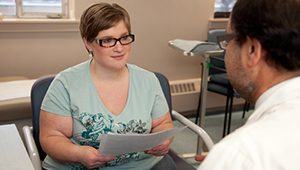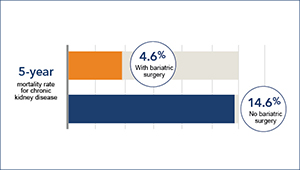Obesity
Research overview
“Obesity is the number-one health problem in the United States because it negatively affects our population’s health more than any other condition,” said Kaiser Permanente Washington Health Research Institute Senior Investigator David Arterburn, MD, MPH. Kaiser Permanente Washington researchers are doing practical research to learn how doctors, patients, families, employers, and policymakers can best work together to prevent and treat obesity.
“We’re focusing on three ways to halt the obesity epidemic,” said Senior Investigator Dori Rosenberg, PhD, MPH. “We’re helping to change obesity-promoting environments, bringing evidence-based prevention and treatment programs into health care systems, and helping people develop lifelong healthy diet and activity habits.”
Kaiser Permanente Washington obesity research areas include:
- reducing sedentary behavior and promoting physical activity and healthy diet in various age groups, populations with chronic conditions, and families;
- shared decision making to help patients find the best way to a healthy weight;
- implementing health coaches in primary care to support behavior changes;
- social networks that support lifestyle change programs;
- relationships between medications and genetic factors in developing obesity;
- health system, community, and national policies that address obesity;
- relationships between obesity and depression, diabetes, and other conditions; and
- long-term benefits and risks of bariatric (weight loss) surgery.
“Obesity is caused by many factors, so at Kaiser Permanente Washington, we’re working on many levels,” said Paula Lozano, MD, MPH, a senior investigator and Kaiser Permanente Washington’s assistant medical director for preventive care. “We’re improving health care to help people who are obese now. But since obesity is a societal problem, we’re also studying how to change our homes and workplaces and neighborhoods to create more healthy environments.”
Recent publications on Obesity
Chen L, Juon HS, Lee S. Acculturation and BMI among Chinese, Korean and Vietnamese adults. J Community Health. 2012 Jun;37(3):539-46. doi: 10.1007/s10900-011-9476-1. PubMed
Arterburn DE, Campos GM, Haneuse S, Sherwood NE, Bogart A, Sidney S, Coleman KJ, Theis MK, O'Connor P, Fisher D. The authors respond: a multisite study of long-term remission and relapse of type 2 diabetes mellitus following gastric bypass. Obes Surg. 2013 Sep;23(9):1456-7. doi: 10.1007/s11695-013-0960-9. PubMed
Wang BC, Wong ES, Alfonso-Cristancho R, He H, Flum DR, Arterburn DE, Garrison LP, Sullivan SD. Cost-effectiveness of bariatric surgical procedures for the treatment of severe obesity. Eur J Health Econ. 2014 Apr;15(3):253-63. doi: 10.1007/s10198-013-0472-5. Epub 2013 Mar 24. PubMed
Dallal CM, Brinton LA, Bauer DC, Buist DS, Cauley JA, Hue TF, LaCroix A, Tice JA, Chia VM, Falk R, Pfeiffer R, Pollak MN, Veenstra TD, Xu X, Lacey JV. Obesity-related hormones and endometrial cancer among postmenopausal women: a nested case-control study within the B~FIT cohort. Endocr Relat Cancer. 2013 Feb 18;20(1):151-60. doi: 10.1530/ERC-12-0229. Epub 2012 Dec 5. PubMed
Thacker EL, McKnight B, Psaty BM, Longstreth WT Jr, Dublin S, Jensen PN, Newton KM, Smith NL, Siscovick DS, Heckbert SR. Association of body mass index, diabetes, hypertension, and blood pressure levels with risk of permanent atrial fibrillation. J Gen Intern Med. 2013 Feb;28(2):247-53. doi: 10.1007/s11606-012-2220-4. Epub 2012 Sep 13. PubMed
Researchers in Obesity
 David E. Arterburn, MD, MPHSenior Investigator |
 Allen Cheadle, PhDSenior Investigator, KPWHRI; Senior Research Associate, CCHE |
 Andrea J. Cook, PhDSenior Biostatistics Investigator |
 Maricela Cruz, PhDAssociate Biostatistics Investigator |
 Nicole M. Gatto, PhD, MPHPrincipal Collaborative Scientist |
 Beverly B. Green, MD, MPHSenior Investigator |
 Mikael Anne Greenwood-Hickman, MPHSenior Collaborative Scientist |
 Paula Lozano, MD, MPHSenior Investigator; Director, ACT Center |
 Dori E. Rosenberg, PhD, MPHSenior Investigator |
 Gregory E. Simon, MD, MPHSenior Investigator |











